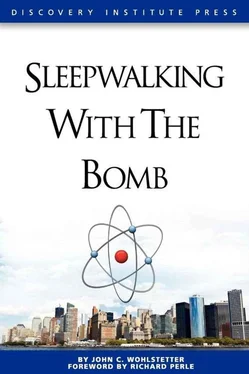John Wohlstetter - Sleepwalking with the Bomb
Здесь есть возможность читать онлайн «John Wohlstetter - Sleepwalking with the Bomb» весь текст электронной книги совершенно бесплатно (целиком полную версию без сокращений). В некоторых случаях можно слушать аудио, скачать через торрент в формате fb2 и присутствует краткое содержание. Город: Seattle, Год выпуска: 2012, ISBN: 2012, Издательство: Discovery Institute Press, Жанр: История, military, Политика, Публицистика, на английском языке. Описание произведения, (предисловие) а так же отзывы посетителей доступны на портале библиотеки ЛибКат.
- Название:Sleepwalking with the Bomb
- Автор:
- Издательство:Discovery Institute Press
- Жанр:
- Год:2012
- Город:Seattle
- ISBN:978-1-93659-906-6
- Рейтинг книги:3 / 5. Голосов: 1
-
Избранное:Добавить в избранное
- Отзывы:
-
Ваша оценка:
- 60
- 1
- 2
- 3
- 4
- 5
Sleepwalking with the Bomb: краткое содержание, описание и аннотация
Предлагаем к чтению аннотацию, описание, краткое содержание или предисловие (зависит от того, что написал сам автор книги «Sleepwalking with the Bomb»). Если вы не нашли необходимую информацию о книге — напишите в комментариях, мы постараемся отыскать её.
RICHARD PERLE, Resident Fellow, American Enterprise Institute and Assistant Secretary of Defense, 1981–1987 Sleepwalking with the Bomb
Sleepwalking with the Bomb — читать онлайн бесплатно полную книгу (весь текст) целиком
Ниже представлен текст книги, разбитый по страницам. Система сохранения места последней прочитанной страницы, позволяет с удобством читать онлайн бесплатно книгу «Sleepwalking with the Bomb», без необходимости каждый раз заново искать на чём Вы остановились. Поставьте закладку, и сможете в любой момент перейти на страницу, на которой закончили чтение.
Интервал:
Закладка:
Suez ended the brief alignment between Britain, France, and Israel. [43] Note that in the decades before Suez, Britain and France had combined to give the Mideast the grim gift of the Grand Mufti. In 1922, early in its 30-year Palestine Mandate, Britain revived the office of Grand Mufti of Jerusalem. The apointee, Amin el-Husseini proved a vile anti-Semitic demagogue who conspired with Hitler to kill Jews. The French held him as a war criminal at war’s end, but in 1946 let him escape to Egypt, and he fomented hatred of Jews and preached radical politics until his death, at age 80, in 1974.
Britain and France never fully recovered from their shattering defeat at Suez. Britain, pro-Arab, rarely was a close ally of the Jewish state, and France became beholden to Arab oil until nuclear power changed its energy equation.
France also allowed a refugee from Iran, one Ayatollah Ruhollah Khomeini, to take shelter in the late 1970s. From there he sent audio-tapes into Iran to supporters. They were played to public audiences in mosques, urging revolution against the Shah. Syria, after a 1970 coup, turned more extreme under Hafez al-Assad. The Assad family was to become radical Iran’s prime surrogate ally in Mideast politics, and a client of the Russians. A Mideast Stalin, Saddam Hussein, brutally seized power in Iraq in 1976.
Then came the fateful year of 1979, when Khomeini established his fascist clerical regime with global revolutionary aspiration, and the Great Mosque seizure led the Saudis to start surreptitiously subsidizing Sunni Islamic extremists around the globe. Islamic Jihad, an al-Qaeda precursor, assassinated pro-Western Egyptian reformer and Arab-Israeli peacemaker Anwar el-Sadat in 1981. Financing the spread of radicalism were petrodollars taken from the West, at grossly inflated cartel prices. Iran, for its part, used petrodollars in 1982 to found Hezbollah, as formidable as any terrorist group in the world today. Iran also funded terror attacks by various Palestinian groups around the globe. And as the Soviet Union’s decade-long Afghan war wound down in 1989, Osama bin Laden founded al-Qaeda.
Thus did the events of 1954–1967 set in motion a cascade of calamities for the West, with a nuclearizing Iran now poised to become the greatest catastrophe of all in the world’s most volatile region, one riven with instability, violence, tyranny, and terror, and seated astride the economic lifeline of the West.
The post-Suez disasters came from a common predicate: America’s failure to use its superpower status to protect the interests of its close allies—interests the U.S. shared, had its leaders grasped the stakes. An American failure to prevent Iran from joining the nuclear club will pose similar dangers. Those who believe we can rely on traditional deterrence are wrong. America’s allies in the Mideast are not confident that the United States can protect them from a nuclear Iran.
As former Saudi intelligence chief Prince Turki al-Feisal has strongly hinted, Saudi Arabia will pursue nuclear weapons if Iran goes nuclear—that is, Iran’s crossing the nuclear weapon threshold “would compel Saudi Arabia… to pursue policies which could lead to untold and possibly dramatic consequences.” Under the circumstances, pursuit of nuclear weapons is understandable, just as it was understandable when David Ben-Gurion decided that only Israel could be trusted to safeguard its own security, a principle to which Israel has adhered ever since.
The latest manifestation of this principle is Israel’s refusal to bow to pressure from the Obama administration concerning a strike on Iran’s nuclear facilities. Israel has refused to accept that it requires American approval for such a strike, partly because it reserves, as does any sovereign nation, the strategic prerogatives of raison d’etât (“reason of state”) and ultima rati o (“last resort”); President Obama recognized these prerogatives in public. But his administration serially leaked information, some of it classified, in a transparent effort to undermine Israel’s case for striking, and to raise the political cost to Israel of acting without administration approval. Thus Israel does not trust the U.S. to back it up diplomatically in the aftermath of a strike, let alone believe that the Obama administration is truthful in asserting that the military option is on the table. Whether Israel’s viewpoint is correct is beside the point. Because Israel believes that it cannot fully trust its ally to give full diplomatic support, it cannot commit to informing its superpower ally before acting.
A similar solicitude for Western security interests would have led the United States to back the Suez operation, bring down a tyrant aiming to upend all pro-U.S. regimes, and hand the Soviets a major regional defeat. To this day we are suffering the baleful foreign policy fallout from the debacle at Suez.
And thus the Eighth Lesson of nuclear-age history: ALLY PROLIFERATION CAN BE PREVENTED ONLY BY SUPERPOWER CONSTANCY. This lesson applies not only to America’s allies, but to other present, former, and aspiring nuclear-club powers. China did not fully trust its super-power guarantor, the USSR, even before their 1962 split made China’s crash nuclear weapon program inevitable. Neither India nor Pakistan had a superpower guarantor, nor, truly, does nuclear aspirant Iran. (South Africa and Libya were pariahs, and North Korea remains one.)
A continued restraining influence upon prospective proliferators can only be effectively exercised by a nuclear ally. Such a partnership extends a nuclear guarantor’s deterrence umbrella to cover states considering an independent deterrent. An American failure to sustain extended deterrence on behalf of its allies in the Mideast will reverberate around the globe. It will not be lost on nuclear-capable allies of the U.S. such as Australia, Japan, South Korea, and Taiwan. Burgeoning regional arms races are a recipe for accelerating the advent of nuclear conflict.
11.
DISARMAMENT I: SUPERPOWER ARMAMENT, POPULAR DISARMAMENT
I thought the mushroom cloud had followed me from Hiroshima.
TSUTOMU YAMAGUCHI, SOLE OFFICIAL SURVIVOR OF BOTH HIROSHIMA AND NAGASAKIIT IS ESTIMATED THAT 165 PEOPLE SURVIVED BOTH BOMBS DROPPED on Japan, but Tsutomu Yamaguchi was the only one officially recognized by the Japanese government to have done so. The 2010 New York Times obituary of the 93-year-old survivor reported that Yamaguchi had been in Hiroshima on a business trip, and then returned home to Nagasaki the next day. Though his eardrums were ruptured and upper torso burned by Hiroshima’s “Little Boy” explosion, he went to the office. He was telling his boss about Little Boy two days later when “Fat Man” lit up the room—and all of Nagasaki—with blinding white light.
The unspeakable human misery and horrific carnage of Hiroshima and Nagasaki, and fears of generations of genetic mutants, gave birth to a vigorous popular disarmament movement. Stalin’s refusal to play along, even while he had no nuclear bomb himself, in no way deterred disarmament dreams. Focusing first on superpower arsenals, disarmament advocates pressed for a “nuclear-free” world. This chapter looks closely at popular movements to disarm and offers the Ninth Lesson of nuclear-age history: POPULAR PRESSURE FOR UNILATERAL DISARMAMENT CAN PREVAIL UNLESS WESTERN GOVERNMENTS EXPLAIN ITS HIDDEN, GRAVE DANGERS.
The Bombings
THE BOMBS dropped on Japan in August 1945 finally ended a world conflagration that had already claimed 50 million lives. It is not hard to understand, however, why they were the beginning of massive public revulsion against nuclear weapons.
The raids were conducted by the Boeing B-29 Superfortress, the world’s finest strategic bomber, whose $3 billion development cost exceeded the cost of the Manhattan Project. In the predawn darkness of August 6, a B-29 nicknamed Enola Gay (after the pilot’s mother) barely cleared the end of the runway on the tiny Pacific island of Tinian, its ungainly five-ton payload still unarmed in case of a crash. From the runway plateau it dipped towards the sea and then climbed to cruising altitude.
Читать дальшеИнтервал:
Закладка:
Похожие книги на «Sleepwalking with the Bomb»
Представляем Вашему вниманию похожие книги на «Sleepwalking with the Bomb» списком для выбора. Мы отобрали схожую по названию и смыслу литературу в надежде предоставить читателям больше вариантов отыскать новые, интересные, ещё непрочитанные произведения.
Обсуждение, отзывы о книге «Sleepwalking with the Bomb» и просто собственные мнения читателей. Оставьте ваши комментарии, напишите, что Вы думаете о произведении, его смысле или главных героях. Укажите что конкретно понравилось, а что нет, и почему Вы так считаете.












